Citric acid is ubiquitous in fruits; you will find it in many fruits besides citrus. However, compared to citrus fruits, the citric acid content of non-citrus fruits is typically negligible and can be zero.
As you may already know, citric acid is responsible for the tartness of citrus fruits. It also contributes to the tartness of some non-citrus fruits. So, one common feature in fruits that do not have citric acid is the absence of tartness.
Below, we list nine fruits without citric acid or negligible amounts of citric acid. We review their taste, pH, organic acids, health benefits, and more.
Table of Contents
Avocado

Avocados have a pH of around 6.3 to 6.6. So, you can already see that they are only mildly acidic and almost neutral. Avocados are non-citrus fruits with a buttery or creamy taste devoid of tartness. The absence of tartness indicates that avocados do not contain citric acid or have insignificant citric acid.
While avocados do not have citric acid, they contain other organic acids. Some of the organic acids in avocados include ascorbic acid (vitamin C), oleic acid, and pantothenic acid. Avocados may also contain tartaric and malic acids, but they are present in negligible amounts.
Avocados offer many potential health benefits, including improving heart health, vision, digestion, and fetal health. Avocados may promote weight loss, mitigate arthritis, and help prevent chronic diseases.
Banana
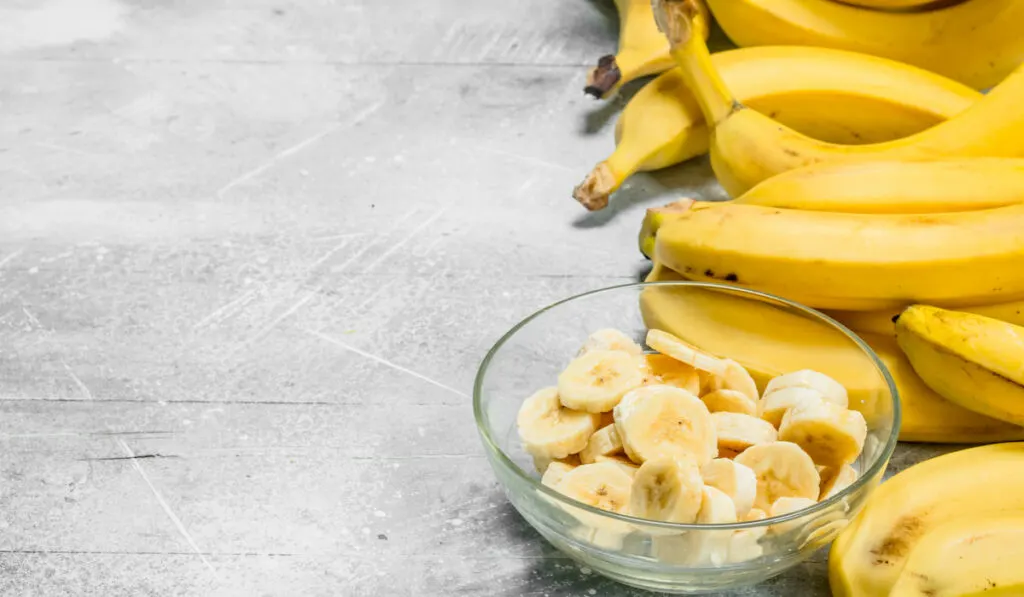
Bananas have a pH of around 4.5 to 4.7, so they are more acidic than avocados. But even at that, bananas are still only mildly acidic.
Bananas are non-citrus fruits with a smooth, soft, sweet taste. They may have little or no citric acid. However, they do contain some other organic acids.
Some of the organic acids in bananas are glutamic acid, oxalic acid, quinic acid, malic acid, aspartic acid, and glycolic acid. Each of these acids is present in minimal quantities.
Like avocados, bananas have positive effects on the heart and digestive system. But beyond that, they may help with blood sugar regulation and kidney health.
Breadfruit
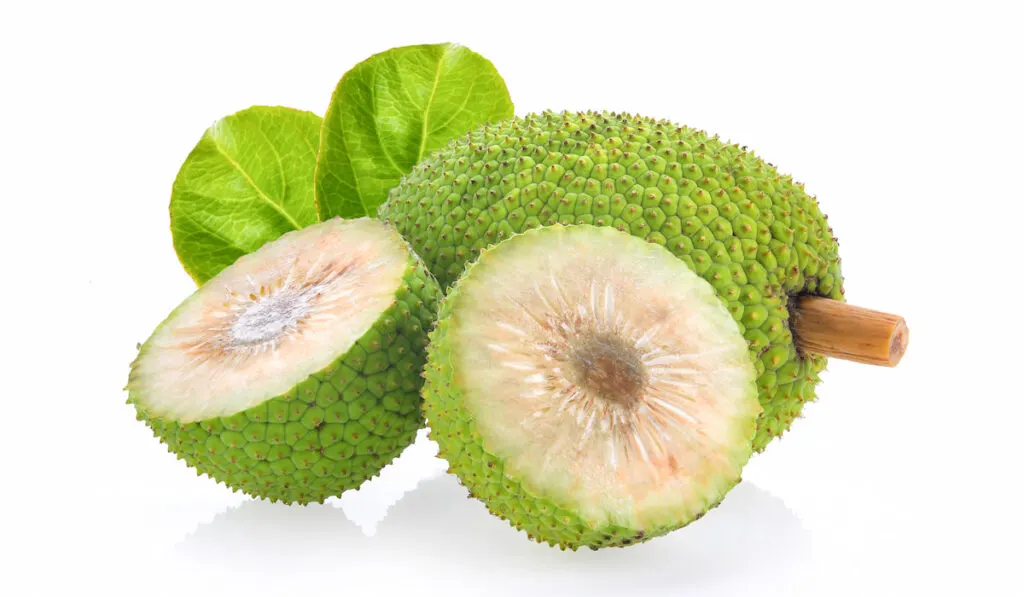
Cooked breadfruit has a pH of around 5.33. Therefore, it is mildly acidic and less acidic than bananas. Breadfruits are non-citrus fruits with a bread-like or potato-like taste. They are not tart as citrus fruits typically are.
While you may find little or no citric acid in breadfruits, they are not devoid of organic acids. You may find that they contain quinic acid, pantothenic acid (vitamin B5), and ascorbic acid (vitamin C).
Breadfruits have ample fiber content, which benefits the digestive system. But besides that, they can promote eye health, help with blood sugar regulation, and minimize the risk of diabetes.
Coconut
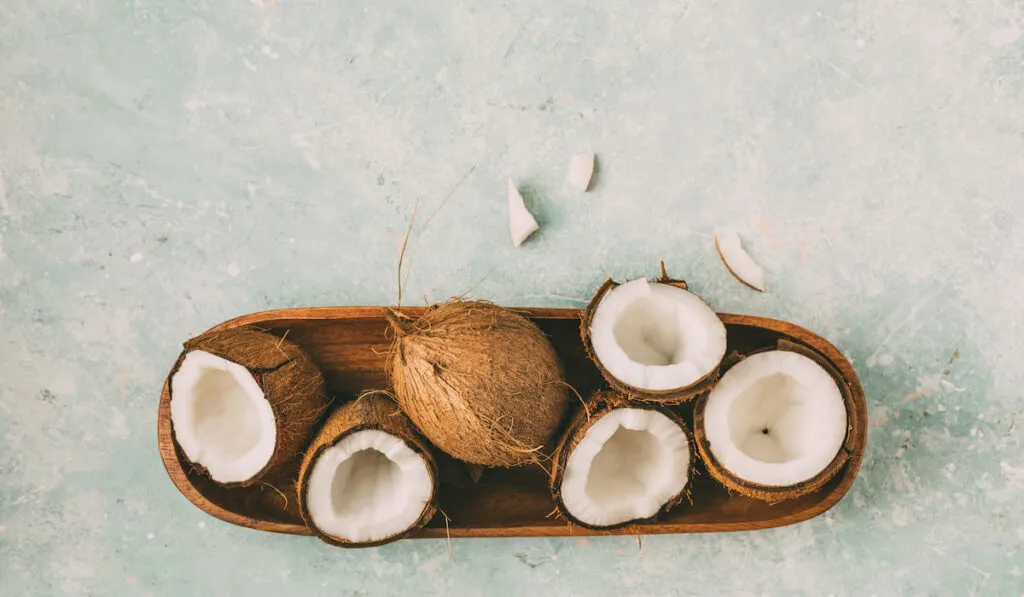
Coconuts have a pH of around 5.5 to 7.8. This means they can be mildly acidic, neutral, or mildly alkaline. They are non-citrus fruits and have a milky, nutty, and sweet taste.
While coconut contains little or no citric acid, it has some other organic acids. They include fatty acids, malic acid, succinic acid, and ketoglutaric acid.
Away from their organic acid content, coconuts are a delicacy. Beyond that, they are highly beneficial. They can help with blood sugar regulation and immunity. Coconuts can also help fight oxidative stress, improve heart and digestive health, and support weight loss.
While coconuts are tasty and healthy, if you are allergic to them, you cannot enjoy them.
Date
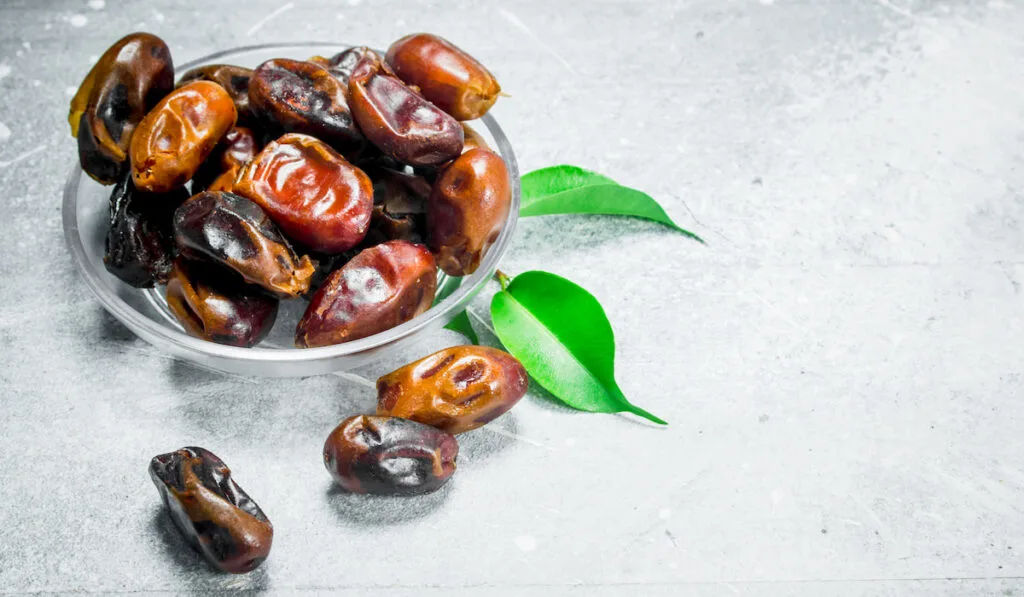
Dates have a pH between 6.5 and 8.5. So, like coconuts, they can be mildly acidic, neutral, or mildly alkaline. Of course, they are non-citrus fruits. So, their citric acid content – if any – is negligible.
The taste of dates depends on age and moisture content. However, they generally have an intense caramel-type of sweetness.
While citric acid is absent or negligible in dates, other organic acids are present. They include malic acid, acetic acid, and succinic acid.
Dates pack a lot of health benefits. Unsurprisingly, some people refer to them as superfoods.
Their high fiber content makes them beneficial to the digestive system. Their antioxidants make them helpful in fighting oxidative stress and chronic diseases.
Dates may also help regulate blood sugar, brain health, and natural labor. But when eaten in uncontrolled amounts, it may cause weight gain.
Eggplant

Some people consider eggplants to be vegetables. However, they are actually fruits. Eggplants have a pH range of around 5.5 to 6.5. This makes them mildly acidic to neutral. They are non-citrus fruits, and they have little or no citric acid.
Eggplants have a sweet taste with a hint of bitterness. Even though they have no citric acid, they contain other organic acids like malic acid, ascorbic acid, and linoleic acid. Still, their overall acid content is minimal.
Eggplants offer a lot of health benefits. For instance, they contain decent amounts of antioxidants. So, they can help the body deal with oxidative stress and some chronic diseases better. Eggplants also contain high fiber, making them ideal for the gut.
Besides the above, eggplants can promote heart and bone health, regulate blood sugar levels, and help with weight loss.
Miracle Fruit
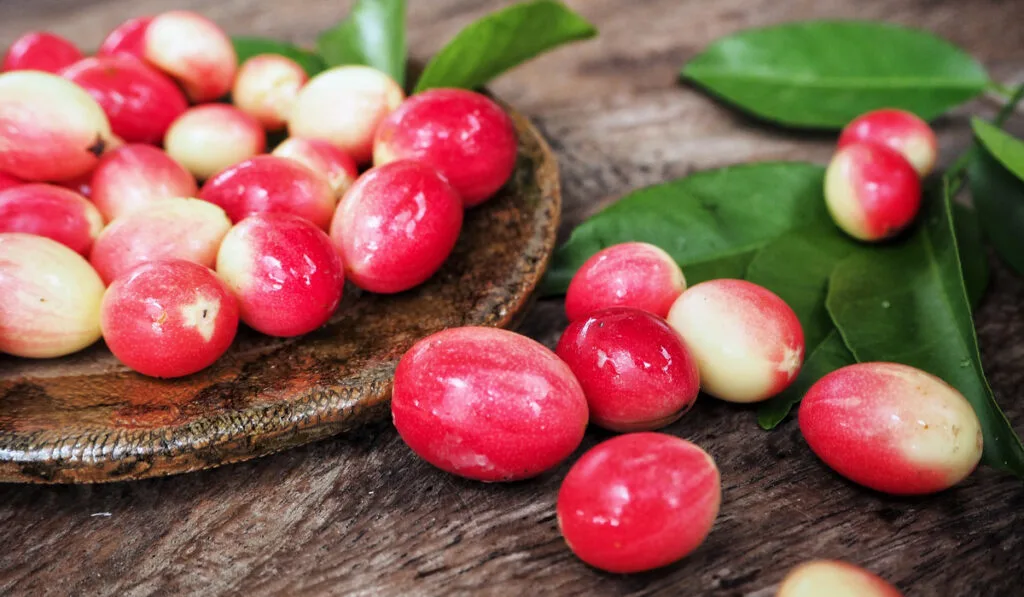
Miracle fruit gets its name from its ability to make people perceive sour substances as sweet. It contains a tasteless glycoprotein, miraculin. The said glycoprotein causes taste receptors to sense sourness as sweet.
The pulp of miracle fruits has a pH of around 3.3, while the skin has a pH of 3.95. Therefore, miracle fruit is acidic. But then, since it is not a citrus fruit, it contains no citric acid.
While miracle fruits might be without citric acid, they have some other organic acids. Prominent amongst those organic acids is ascorbic acid.
Besides their culinary uses, miracle fruits find various applications in traditional medicine. They may help to mitigate seizures and regulate blood sugar levels. They can also help with weight loss and gout treatment.
Noni
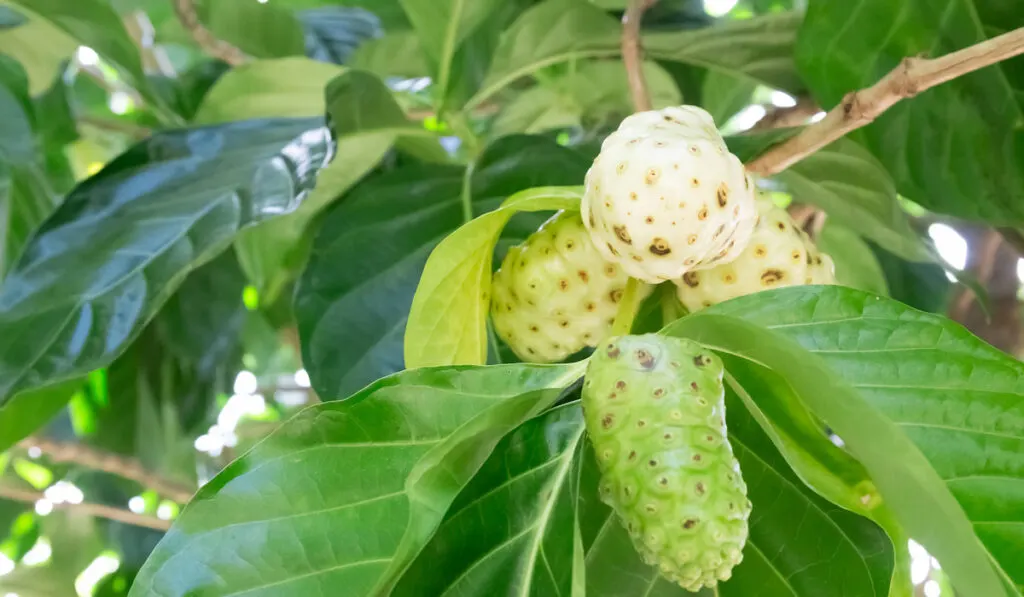
Noni fruits typically have no citric acid. But even when they do contain citric acid, the concentrations are tiny.
Noni fruits have a pH of around 3.5, so they are acidic. Unsurprisingly, they have a tart taste, which can become even sourer with age.
Noni fruits are non-citrus. While they may lack citric acid, they come with other organic acids. They contain acetic, malonic, ascorbic, and galacturonic acid. They also have tartaric acid, succinic acid, and dehydroascorbic acid.
Noni fruits can be good for your body in various ways. They may help promote joint, bone, and gum health and immunity.
Noni fruits could also help with blood pressure regulation, weight loss, and physical endurance. They are helpful to smokers as they promote heart health and mitigate cellular damage caused by tobacco.
Pitaya
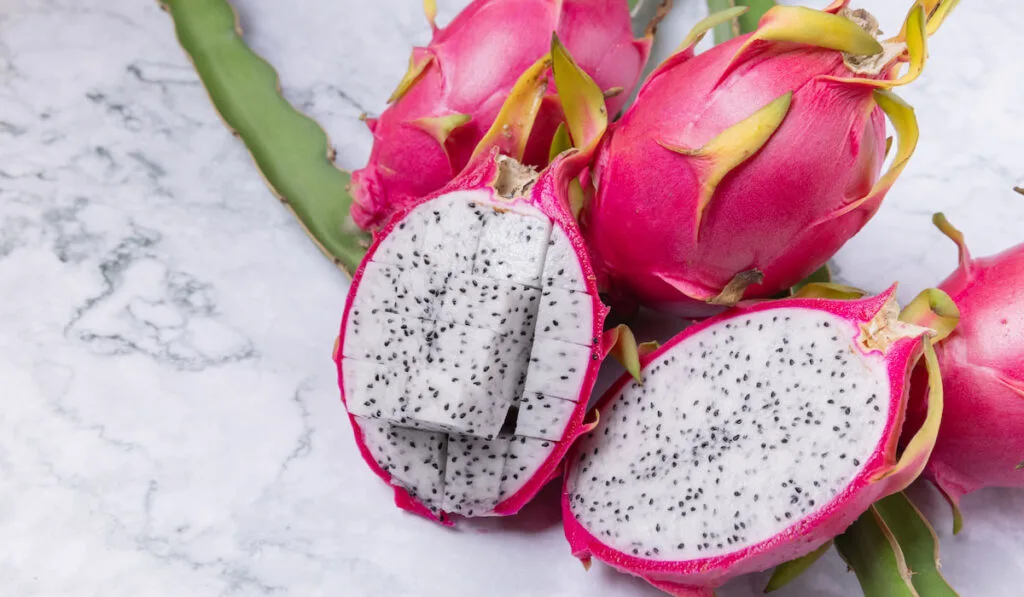
Pitaya – also known as Dragon Fruit – has a pH of around 6 to 7. This makes it mildly acidic to neutral. It is a non-citrus fruit with a slightly sweet taste.
Pitayas have little or no citric acid. However, they contain malic acid and citramalic acid as their predominant organic acid.
Thanks to their rich antioxidant profile, pitayas can help the body fight oxidative stress better. Apart from that, they contain fiber and prebiotics, making them perfect for the digestive system. Pitayas may also help with blood sugar regulation and immunity.
Resources
- https://www.engineeringtoolbox.com/food-ph-d_403.html
- https://www.medicalnewstoday.com/articles/318620
- https://www.medicalnewstoday.com/articles/270406#benefits
- https://academic.oup.com/plphys/article-pdf/39/4/630/35668510/plphys_v39_4_630.pdf
- https://www.healthline.com/nutrition/11-proven-benefits-of-bananas
- https://www.pickyourown.org/ph_of_fruits_and_vegetables_list.htm
- https://www.hindawi.com/journals/jfq/2018/5697928/
- https://www.verywellfit.com/breadfruit-nutrition-facts-calories-carbs-and-health-benefits-4773017
- https://www.ncbi.nlm.nih.gov/pmc/articles/PMC5821652/
- https://www.healthline.com/nutrition/coconut-nutrition
- https://www.medicalnewstoday.com/articles/318394
- https://www.healthline.com/nutrition/benefits-of-dates
- https://american-jiras.com/Agbessi%20%20ManuscriptRef.1-ajiras051216.pdf
- https://www.healthline.com/nutrition/miracle-fruit-benefits
- https://www.thespruceeats.com/what-is-eggplant-1807763
- https://www.researchgate.net/figure/Organic-acids-sugars-and-polyamines-content-in-fruit-of-seven-eggplant-cultivars_tbl1_284121982
- https://www.healthline.com/nutrition/eggplant-benefits
- https://www.ctahr.hawaii.edu/noni/fruit_juices.asp
- https://www.researchgate.net/figure/Sugars-Organic-Acids-and-Alcohol-Composition-of-Noni-Fruit-Exudate-during-28-Days-of_tbl1_274265933
- https://www.ncbi.nlm.nih.gov/pmc/articles/PMC5920423
- https://www.healthline.com/nutrition/noni-juice#benefits
- https://foodfaq.org/is-dragon-fruit-acidic
- https://www.tandfonline.com/doi/pdf/10.1080/19476337.2020.1738557
